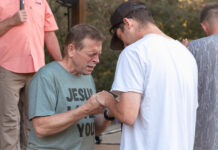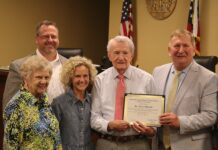There are so many fees that stack on top of each other when a person commits a misdemeanor. There is the initial fee that can go up to $1000, followed by a monthly fee that the city, county, or private probation office has to issue to cover operation expenses.
On top of all of this, there is a state fee of $9 that goes into the Georgia Crime Victim Emergency Fund (GCVEF). This is a state fund that is used to help crime victims in Georgia that don’t have insurance or can’t pay their medical expenses.
With all of these fees and fines piling up, it is easy for a person to fall behind on their payments. When that happens, probationers are often sent to jail, but not in Cornelia, not anymore.
Private probation offices are allowing indigent offenders to work community service hours in order to decrease the fines levied against them. Indigent offenders are people that demonstrate that they can’t pay the money issued by the courts. Offenders work for the standard minimum wage for Georgia which is $5.15 according to ncsl.org.
However many hours they work, that money gets deducted from the fine that the offender has to pay. Offenders don’t have to do community service to pay off the whole fine. They can pay off some of it by working community service and then pay the rest by cash or credit.
Director of Probation Services for Cornelia, GA, Chris Simmons says, “The city as to be flexible with indigent offenders that can’t work. They have to bring in some type of verification they are unable to work, injured, or on disability.”
What happens if an offender gets another misdemeanor while trying to pay off the first fine? They don’t have to worry about paying both fines at the same time because the fines are consecutive. The offender pays off the first fine and then starts paying the second one.
There is a process for offenders to join this program. First, they have to go to the courts and get their sentence. Next, they go the initial meeting with Simmons to allow him to get to know the offender. Simmons asks if the offender is employed, has any drug addictions, or if they have any disabilities and other questions to determine if that person is eligible for the probation community service program.
Simmons says, “Some people try to use the probation program as a way to extend the time it takes for them to pay the fine, or a way to not pay any money at all when they have the money to pay for. It’s basically the courts and my decision on whether offenders should be allowed on this program.”
On average, Simmons has 14 to 15 probationers working community service during the week and approximately 20 people working on weekends. Offenders in the program normally work their real jobs and then work for the probation office when they are available.
The jobs that the offenders can work on include beautification projects throughout the city of Cornelia. If the offender is a student, they can work for the fire department or animal shelter so that they can work on the weekend. Simmons says about 80% of probation workers in the program spend their community service hours working for the City of Cornelia.






